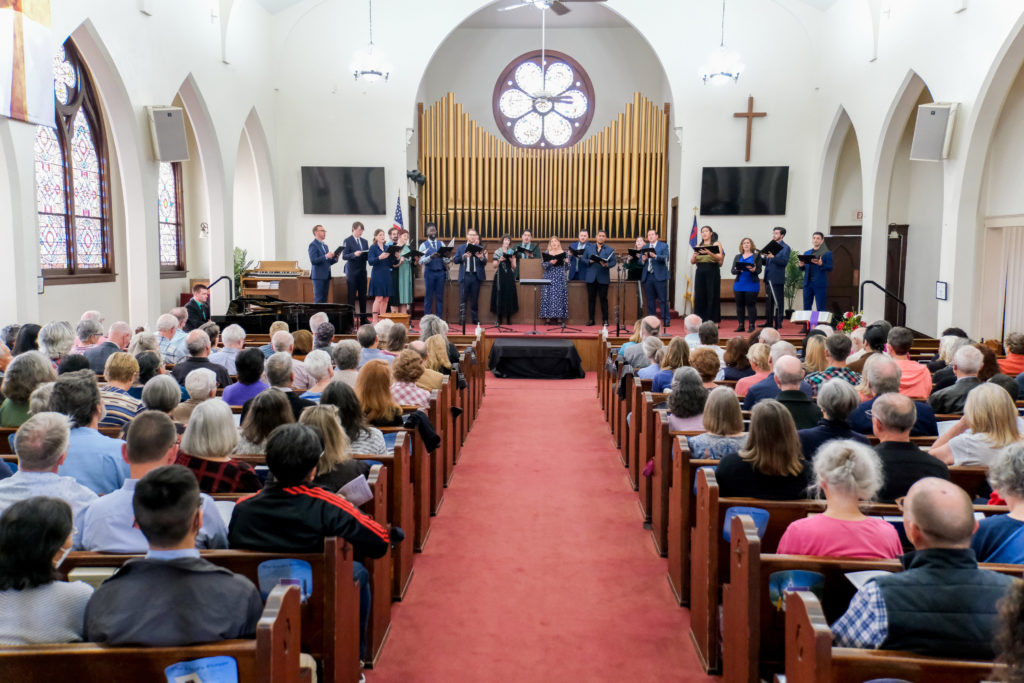Sacra/Profana’s Choral Triumph: ‘The Hope of Loving’
San Diego’s elite ensemble Sacra/Profana opened its 15th season Saturday with The Hope of Loving, a concert devoted to contemporary expressions of African-American choral music. A rich musical genre for any season, this program saluted Black History Month and took place at Christ United Presbyterian Church in San Diego’s South Park neighborhood, a congregation founded by the late Rev. Dr. George Walker Smith, in his day the leading African-American ministerial voice in San Diego politics.
Sacra/Profana Artistic Director Juan Carlos Acosta opened this concert with “Song of Hope” by Florence Price, a composer who has until recently been confined to a single historical footnote: the first African-American woman composer to have her symphony performed by a major orchestra, the Chicago Symphony under Frederick Stock in 1933. Since the turn of the 21st century, however, the music of Florence Price has undergone a long overdue renaissance, and her orchestral and chamber works have returned in welcome number to North American concert halls.Price wrote “Song of Hope” in 1930 for chorus, orchestra, and three vocal soloists, a precursor to her symphony that Chicago premiered, but a clear indication of her grasp of vibrant symphonic textures similar to the music that Howard Hanson and Samuel Barber produced in that decade. Sacra/Profana resident accompanist Adam Ferrara gave a compelling piano transcription of Price’s orchestra score, and strong vocal soloists Uriah Brown, Becca Ung, and Katina Mitchell revealed the work’s dramatic flair. Under Acosta’s sensitive direction, the chorus clearly differentiated Price’s defiant cries of oppression with their melodic echoes of traditional spirituals from her more tranquil stanzas of spiritual conciliation.
While the modest length of “Song of Hope” suggests an extended anthem, Judith M. Baity’s Mary McLeod Bethune Suite is clearly an oratorio in its scope. Sacra/Profana performed the four choral sections of this work—“Love,” “Hope,” “Power,” and “Faith”—passionate settings of challenging words by Mary McLeod Bethune, an early civil rights leader who served in the cabinet of President Franklin D. Roosevelt. The musical style of Los Angeles-based Baity struck me as surprisingly retro for 2003, although I detected some jazzy flourishes in the instrumental introduction to her “Love” movement. Sacra/Profana’s lush choral sonority in this movement brought to mind the sound of the popular Fred Waring choral groups from early 1950s radio and television, and her a cappella movement “Hope” has that endearing Randall Thompson harmonic predictability. In “Power,” however, Baity’s music gives Bethune’s stirring words a more complex combination of pulsing rhythmic motifs that provides welcome edge to her long, arching choral themes. The Mary McLeod Bethune Suite clearly is a work that deserves a complete performance with orchestra and soloists in San Diego!
Roland Carter’s robust “Hold Fast to Dreams,” his setting of a Langston Hughes text, displays both muscular choral themes and a bold harmonic design that communicates the passion beneath Hughes’ taut, polished poetry. And an exciting, soaring solo by soprano Jasper Sussman crowned this work with unimpeachable aspiration.
Brandon Waddles of Michigan’s Wayne State University music faculty adroitly interweaves two traditional spirituals, “Let Us Cheer the Weary Traveler” with “He’s Got the Whole World in his Hand,” giving the most familiar themes to the mezzo-soprano soloist, sung with deep conviction and gorgeous tone by Danielle Perrault. The composer develops the “Whole World” themes into a surging climax, opulent choral clusters supported by the piano’s explosive octave flourishes.
In “Can You See,” Zanaida Robles, another flourishing African-American composer based in Los Angeles, has juxtaposed slogans from protesters’ signs with lines from the National Anthem to create a telling commentary that challenges complacent patriotism. Her sophisticated a cappella counterpoint and assertive thematic development persuasively support her lofty ideals. With a similar critical eye, Shawn Kirchner recast the text of Katherine Lee Bates’ “America the Beautiful,” enumerating in his text some of the sins only hinted at in Bates’ terse line “God mend thine every flaw.”
With Roland Carter’s exhilarating arrangement of “Lift every Voice and Sing,” Sacra/Profana and Acosta brought their concert to its triumphant conclusion.
This concert was presented by Sacra/Profana at Christ United Presbyterian Church, San Diego, on Saturday, February 24, 2024.

Ken Herman, a classically trained pianist and organist, has covered music for the San Diego Union, the Los Angeles Times’ San Diego Edition, and for sandiego.com. He has won numerous awards, including first place for Live Performance and Opera Reviews in the 2017, the 2018, and the 2019 Excellence in Journalism Awards competition held by the San Diego Press Club. A Chicago native, he came to San Diego to pursue a graduate degree and stayed.Read more…


A terrific concert by an outstanding choir and very talented Director!